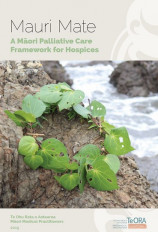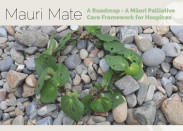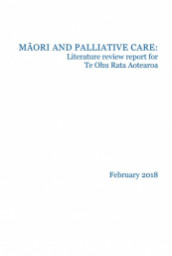Palliative care is an approach that aims to improve the quality of life of patients and their families facing a life-threatening illness. Prevention and relief of suffering is achieved by means of early identification, thorough assessment and treatment of pain and other problems, physical, psychosocial and spiritual.
Low or no data? Visit zero.govt.nz, scroll down the page then click on our logo to return to our site and browse for free.
Palliative care for healthcare providers
Key points about palliative care
- This page contains information about palliative care for healthcare providers.
- Find information on components of palliative care, the Mauri mate framework, pathways and tools.

End-of-life care can be divided into three key components:
- A comprehensive baseline assessment – involves identification of the lead practitioner, assessment of clinical needs, sensitive and open communication and clear documentation.
- Ongoing assessment – with emphasis on the importance of developing individualised care plans.
- After death care – includes verification of death and the need of the family/whānau for information and privacy.
Each of these stages of care needs to be addressed in a way that respects the cultural, spiritual, religious and family issues that are unique to the dying person.
Karakia
Ko tēnei te ara kei runga
Ko te ara o tēnei Tipua
Ko te ara o tēnei Ariki
Ko te ara o tēnei Mātua-a-iwi
Ko te ara o Ranginui e tu nei,
O Papatūānuku e takoto nei
Kia rarau iho ra ngā tapuwae o Tāne
Ko tēnei te pō, nau mai te ao
Tihei mauri ora
A Māori palliative care framework for hospices
Mauri mate is a framework with palliative care guidelines for hospices in New Zealand, aiming to provide adult Māori with good palliative care.
The 3 main aims of the framework include:
- good (quality) care in the lead-up to the end-of-life
- good comfort (compassionate) care at the end-of-life
- helpful whānau support during and after the illness, and the end-of-life (including spiritual care and grief support).
The framework is also applicable to primary care, aged residential care, hospital teams and whānau care.
You can find the main framework along with a roadmap and a literature review report below.
| Resources | |
 |
Mauri mate – a Māori palliative care framework for hospices(external link) |
 |
He ara tohu – a roadmap(external link) |
 |
Māori and palliative care – literature review report for Te Ohu Rata Aotearoa(external link) |
The development of a model of palliative care for NZ
In November 2013, the Ministry of Health commissioned the Palliative Care Council to investigate developing an appropriate palliative care model for NZ. This led to development of a NZ focused model, Te Ara Whakapiri, which was released in December 2015.
Te Ara Whakapiri
Te Ara Whakapiri – principles and guidance for the last days of life(external link) is a New Zealand model developed in 2015 to help guide management of last days of life.
- Te Ara Whakapiri outlines the essential components and considerations required to promote quality care at the end of life for all adults in New Zealand.
- It also provides examples of useful approaches and tools that will serve as aids for the development of national and/or local resources as part of implementation.
Te Ara Whakapiri Toolkit(external link) (See individual toolkit sections below):
- Care in the last days of life(external link)
- Ongoing care of the dying person(external link)
- Home care in the last days of life(external link)
- Recognising a dying person – Flow chart(external link)
- Medical management planning – General principles(external link)
- Bereavement risk assessment tool(external link)
- Symptom management guidelines(external link)
- When death approaches(external link)
- Dying at home(external link)
The following 7 principles were used to help define Te Ara Whakapiri:
- Care is patient-centred and holistic.
- The health care workforce is appropriately educated and is supported by clinical champions.
- Communication is clear and respectful.
- Services are integrated.
- Services are sustainable.
- Services are nationally driven and supported to reduce variation and enhance flexibility.
- Resources and equipment are consistently accessible.
These 7 principles are underpinned by Te Whare Tapa Whā, a model of care that is concerned with the total wellbeing of the person and their family/whānau.
Underpinning this model of care is the recognition that if a person in the last days of life has a level of need that exceeds the resources of the primary palliative care provider, that provider should refer them to specialist palliative care.
Supportive & palliative care indicators tool (SPICT™)
The SPICT™ is a guide to identifying people with one or more advanced conditions, deteriorating health and a risk of dying for assessment and care planning.
- It is used around the world and was first developed as a collaborative project between NHS Lothian and The University of Edinburgh Primary Palliative Care Research Group.
- Guide to using SPICT™ in Primary Care(external link) and in Hospital(external link) (PDF File)
- SPICT Tool(external link) 4 languages
- SPICT website and more resources(external link)
The aim of this resource is to make palliative care understandable for healthcare professionals, using clear logical layout and understandable explanations of how to manage and cope with problems that can be very challenging. It includes sections on dementia, nutrition and prescribing. The Handbook is useful in any place where palliative care happens – it gives confidence to those who use and it and therefore hopefully comfort to the people approaching the end of their lives.
Download the handbook here(external link).
Starting conversations with people whose health is deteriorating can be difficult and needs to be done sensitively, but it is very important.
Here are some tips on ways of getting started:
- What do you know about your health problems and what might happen in future?
- Some people worry about what will happen if they are less well – how do you feel about that?
- We would like to hear about anything that is particularly important to you or your family….
- Sometimes people want a family member or a close friend to make decisions for them if they get less well…Is that something you’d like to talk about?
- We hope you will stay well for a long time, but we are worried about what might happen if …
- It is hard to talk about getting less well, but I worry that if we don’t do that we will not be able to make good decisions about your care. What would be the best way for us to talk about this?
(Suggested questions from the SPICT website(external link))
Continuing professional development
Webinar: Tender conversations(external link) Dr Kathryn Mannix, Palliative Care Physician (Retired) and Best-selling author
About this presentation:
We all probably have a conversation we’re avoiding. It’s important, but it feels tricky. Often, we feel daunted by the strong emotions involved. We’re not sure how to begin, or whether we should try to. ‘Tender Conversations’ will consider the principles that help us to open, begin, continue and finish these important yet daunting conversations in a way that is helpful and safe.
You can watch the video, answer questions and claim hours with a certificate.
Standards for palliative care(external link) Hospice NZ
Te Ara Whakapiri – principles and guidance for the last days of life(external link) Ministry of Health NZ
Palliative care and Māori from a health literacy perspective(external link) Ministry of Health NZ
NZ palliative care glossary(external link) Ministry of Health NZ
Referral criteria for adult palliative care services in NZ(external link) Ministry of Health NZ
Guidance for integrated paediatric palliative care services in NZ(external link) Ministry of Health NZ
The palliative care council of NZ’s position on euthanasia(external link) Ministry of Health NZ
Measuring what matters – palliative Care(external link) Ministry of Health NZ
Adult network guidelines(external link) Palliative Care Adult Network UK
Serious illness conversation guide Aotearoa(external link) Health Quality & Safety Commission, NZ
The palliative care bridge(external link) educational videos and resources on palliative care by respected experts and specialists in their fields.
Programme of courses(external link) Te Omanga Hospice, Lower Hutt
End of Life Care: Challenges and Innovation(external link) Future Learn (paid course) 4 hours a week for 3 weeks This course is for people interested in or engaged in matters relating to death, dying, bereavement, palliative and end of life care.
Video: Prognosis in palliative care webinar
Professor Paddy Stone, MA, MD, FRCP talks about the role of prognostic information and communication play in reducing the prevalence of burdensome treatments at the end of life.
(Mobile Health, NZ, 2021)
Video: The principles of palliative care
Ann Laramee, Nurse Practitioner at the University of Vermont Medical Center, discusses principles in palliative care including how to integrate palliative care in heart failure management, how to affirm life and regard dying as a normal process, how to discuss prognosis, and when to refer to specialty palliative care or hospice.
(Abbott Cardiovascular, US, 2021)
Credits: Healthify editorial team. Healthify is brought to you by Health Navigator Charitable Trust.
Page last updated:


